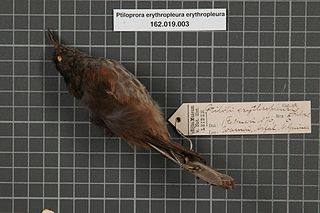
Convolvulaceae, commonly called the bindweeds or morning glories, is a family of about 60 genera and more than 1,650 species. These species are primarily herbaceous vines, but also include trees, shrubs and herbs. The tubers of several species are edible, the best known of which is the sweet potato.

Tilapia is the common name for nearly a hundred species of cichlid fish from the coelotilapine, coptodonine, heterotilapine, oreochromine, pelmatolapiine, and tilapiine tribes, with the economically most important species placed in the Coptodonini and Oreochromini. Tilapia are mainly freshwater fish inhabiting shallow streams, ponds, rivers, and lakes, and less commonly found living in brackish water. Historically, they have been of major importance in artisanal fishing in Africa, and they are of increasing importance in aquaculture and aquaponics. Tilapia can become a problematic invasive species in new warm-water habitats such as Australia, whether deliberately or accidentally introduced, but generally not in temperate climates due to their inability to survive in cold water.

Plantaginaceae, the plantain family, is a large, diverse family of flowering plants in the order Lamiales that includes common flowers such as snapdragon and foxglove. It is unrelated to the banana-like fruit also called "plantain." In older classifications, Plantaginaceae was the only family of the order Plantaginales, but numerous phylogenetic studies, summarized by the Angiosperm Phylogeny Group, have demonstrated that this taxon should be included within Lamiales.

Grass skippers or banded skippers are butterflies of the subfamily Hesperiinae, part of the skipper family, Hesperiidae. The subfamily was established by Pierre André Latreille in 1809.

Nyctaginaceae, the four o'clock family, is a family of around 33 genera and 290 species of flowering plants, widely distributed in tropical and subtropical regions, with a few representatives in temperate regions. The family has a unique fruit type, called an "anthocarp", and many genera have extremely large pollen grains.
Pristimantis erythropleura is a species of frog in the family Strabomantidae. It is endemic to Colombia. Its natural habitats are tropical moist montane forests and heavily degraded former forest. It is threatened by habitat loss.

The rufous-sided honeyeater is a species of bird in the family Meliphagidae. It is endemic to West Papua, Indonesia.
Ptiloprora is a genus of birds in the honeyeater family Meliphagidae that are endemic to New Guinea.

Elachiptera is a genus of frit flies in the family Chloropidae. There are about 18 described species in Elachiptera.

Oscinellinae is a subfamily of frit flies in the family Chloropidae. There are at least 40 genera and 180 described species in Oscinellinae.

Diapheromera is a genus of stick insects in the family Diapheromeridae. There are about 14 described species in Diapheromera.
Elachiptera nigriceps is a species of frit fly in the family Chloropidae.
Elachiptera angusta is a species of frit fly in the family Chloropidae.
Elachiptera costata is a species of frit fly in the family Chloropidae.
Elachiptera longiventris is a species of frit fly in the family Chloropidae.
Mixogaster breviventris is a species of syrphid fly in the family Syrphidae.
Chrysotoxum chinook is a species of syrphid fly in the family Syrphidae.
Aradus funestus is a species of flat bug in the family Aradidae. It is found in North America.
Aradus depictus is a species of flat bug in the family Aradidae. It is found in North America.
Animal Ethics is a nonprofit organization formed to promote discussion and debate around issues in animal ethics and to provide information and resources for animal advocates. They also do outreach work in several countries on the issue of speciesism. Their aim is to create a world where moral consideration is extended to all sentient beings. The organization's website covers topics such as speciesism, sentience, veganism and wild animal suffering and has content translated into several languages.








